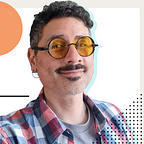A team is more than a bunch of people and a backlog of things to do. What makes a group of people a team is more profound and requires not only time but also work.
The work should focus on people and their interactions, on building a common goal, defining a way of working, learning from the experience, and constantly improving.
In this article, I’ll present the Personal Collab Cards by Management 3.0, one of my favorite tools to start the team-building journey. This practice will help people introduce themselves in a meaningful way, which will contribute to creating stronger relationships.
Are you working with remote teams? No problem, I also will share a Mural template that includes Personal Collab Cards ready to be completed by every team member.
A Manual About Yourself
Where are you located and what are your working hours?
What’s your role and are your professional domains?
What’s the best way to communicate with you?
and also more personal questions, what other topics (privately) are you interested in?
Those are part of the things you will discover from your teammates after putting Personal Collab Cards into practice.
Let’s help your team get to know each other by inviting them to reflect on themself first and then build a personal manual to share with others.
Why Personal Collab Cards
From an Agile Coach’s perspective, I subscribe to The Heart of Agile, which is an up-to-date and genuine approach that divides Agile into four imperatives:
- Collaborate
- Deliver
- Reflect
- Improve
All of them are equally important and relevant if we want to become an agile team and yet it is collaboration that makes the foundation to develop the rest of them.
This is where Personal Collab Cards come into play to help the team get to know each other both professionally and personally in a fun way.
They are also very useful in multicultural teams where there may be cultural clashes that inadvertently harm people’s moods. Knowing firsthand what demotivates others will be beneficial to avoid these kinds of liabilities in the future.
This activity will help facilitators build connection and engagement among team members, and foster social interactions in a context of transparency and authenticity, where everybody feels safe, seen, and heard.
How to Use Personal Collab Cards in a “Meet the Team” Session
Every time I start working with a new team I invite them to a “Meet the Team” session.
On the invitation, I ask them to complete their own Personal Collab Card before the session.
I prefer to request this in advance to give them the time to decide what they want to share so that we can use the time of the session together for the introductions.
In Mural, we have the “Copy link to step” option to share with the team only the link to a specific area of the board. That allows us to keep other areas hidden if we want to surprise our audience.
I strongly recommend that the facilitator lead by example and be sure to fill out their collab card before sending the invitation to the team.
The activity is self-explanatory and everyone will find it easy to understand.
Every team member will pick a card and enter their information by double-clicking on every “Type them here” area.
After their card is complete they will move it to the Cards area.
During the session where everyone is online, the facilitator will invite every teammate to introduce themselves in turns.
The facilitator should set a context of respect, inclusion, and psychological safety where everyone is actively listening while others introduce themselves.
In the end, the facilitator might want to copy every card as an image on a team’s wiki page or shared team space.
Are you ready to “Meet your Team”?
Get the ready-to-go MURAL template to share the pre-work activity with your team!
My learnings as a facilitator
This is an excellent activity that can be facilitated by beginners and most experienced facilitators.
It is also useful for a project kick-off meeting where people have been assigned to the project but haven’t met yet. I love to use Personal Collab Cards as part of the first Agile retrospective because it impacts directly on people’s interactions.
In my experience, after these kinds of sessions, they find several things in common to talk about apart from their work responsibilities, which makes them more open to helping each other in the future.
While we’re designing activities where we invite people to talk it’s important to define the time we will allot to the whole activity.
Take into account some people are more talkative than others and it’s very important to give everyone the same opportunities to express themselves.
It takes around 5 to 7 min per person to introduce themselves. So, if you have a team of 5 people, including yourself, that could take about half an hour.
Another alternative that I use when I don’t have that amount of time is inviting everyone to read in silence other people’s cards. Then I ask everyone to share one or two things that caught their attention.
I invite you to try Personal Collab Cards in a “Meet the Team” Session to see how it works for you.
I advise you to put it into practice today so that you can improve it on the go.
Finally, remember all teams are different and this keeps us facilitators on our toes!
I would love to hear how these ideas worked for you, so please share your experiences with me to help me improve this practice.
Good luck with your digital facilitations!
